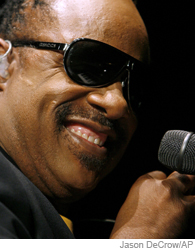Stevie Wonder, the Motown sensation, chart topper, producer and humanitarian, has been in the spotlight for four decades.
Early Days
Stevland Hardaway Judkins was born prematurely on May 13, 1950, in Saginaw, Michigan. He was placed in an incubator, and according to Allmusic, Wonder suffered from a syndrome called retinopathy of prematurity.
Never hindered by his blindness, Steveland began his musical career when his family moved to Detroit and he started singing in his church choir. When he was 11, pop star Ronnie White heard Steveland playing for his friends and secured him an audition with Berry Gordy, the owner of Motown Records. Gordy signed him immediately and gave him the new name of “Little Stevie Wonder,” the young musician released two records to unimpressive sales. In 1963, however, Allmusic reports that he put out “The 12 Year Old Genius,” a live album that soared to the top of the charts.
According to the Rock and Roll Hall of Fame, Wonder’s “Fingertips, Pt. 2,” a concert track from that album, is “the first live single in history to reach Number One,” and was a premonition of Wonder’s longstanding prowess as a live musician.
Sources in this Story
- Allmusic: Stevie Wonder
- The John F. Kennedy Center for the Performing Arts: Biography of Stevie Wonder
- Rolling Stone: Stevie Wonder: Biography
- NME: Stevie Wonder
- Rock and Roll Hall of Fame: Stevie Wonder
- The Wall Street Journal: Washington Wire: Stevie Wonder Kicks Off Obama Rally
- The Daily Mail (U.K.): ‘The guest list is spectacular’: Stevie Wonder, 67, set to wed third wife Tomeeka Bracy, 42, in a star-studded beachside ceremony in Jamaica
Notable Accomplishments
Wonder, no longer “Little,” eventually felt stifled by the control that Motown records exerted and made two records independently when his contract expired. Using his independent projects as leverage during negotiations, Wonder succeeded in becoming one of the first artists to sign a contract entitling him to creative freedom and the rights to his music, as the Kennedy Center explains in a biography of Wonder.
Unfettered by guidelines or requirements from the record company, Wonder was able to express strong political and social messages through his music; for example, Allmusic reports that the song “Happy Birthday” was written as part of a campaign to make Martin Luther King Day an official holiday. As the Kennedy Center puts it, “The magic of his music is matched by his passionate commitment to political causes and charities.” Wonder was an “early and outspoken critic of apartheid in South Africa and has also been deeply involved in the global war against famine.”
Wonder’s biography in Rolling Stone magazine reads like a laundry list of hit songs, awards and achievements, enumerating his politically-infused songs, like “Superstition,” as well as more traditional romantic tracks such as “You Are the Sunshine of My Life,” both of which were number-one hits. Wonder notably toured with the Rolling Stones in 1972 and continued to top the charts throughout the 1970s. In 1985, he won an Oscar for “I Just Called to Say I Love You,” which was featured in the movie “The Woman in Red.”
As his own producer, Wonder gained the skills to produce other artists’ albums, as the British music magazine NME recounts in Wonder’s biography, including albums for fellow Motown artist Syreeta, his first wife.
In 1989, Wonder received a lifetime achievement Grammy and was inducted into the Rock and Roll Hall of Fame.
The Man and His Work
The Rest of the Story
The Wall Street Journal reported that Wonder was a supporter of President Barack Obama’s campaign. In May 2008, he performed at an Obama rally hours before the primaries opened in Indiana. He played “Signed, Sealed, Delivered I’m Yours,” and spoke to the crowd about the evils of prejudice, calling himself a “man who has the vision of the heart because I am color free.”
Wonder continues to tour and perform, and as of April 2017, was reportedly planning to wed Tomeeka Bracy in the summer.











